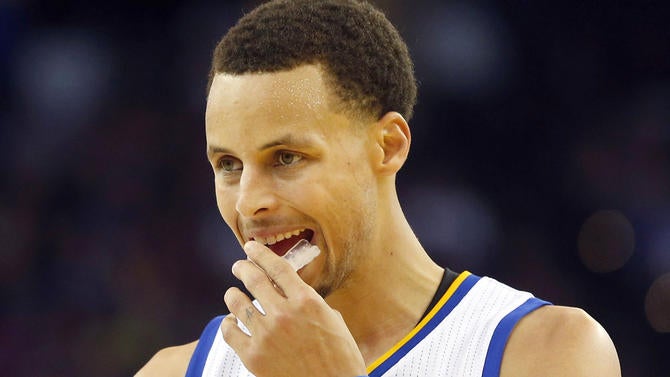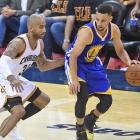Somewhere, the stars of yesteryear, who either didn't embrace the 3-point shot or never had the chance to, are enjoying the twists and turns of the 2016 NBA Finals. With the Cleveland Cavaliers on the brink of the greatest comeback in NBA Finals history, Golden State Warriors demigod Stephen Curry has been stifled throughout much of this series.
The Finals were supposed to be the stamp on the coronation of the 73-9 Warriors, and when they were up 3-1 in the series, that's exactly what it felt like. Golden State had rediscovered its dominance and everything at that point was just mathematical in how it would finish it off. Then Draymond Green was suspended for Game 5 and the Cavs survived. The Cavs went back home for Game 6 and survived again. Now they're looking to pull off the improbable and the way they've stifled the unanimous MVP has gone a long way toward making that a possibility.
Criticism against Curry in a historical sense has been the idea that he is too slight and not strong enough to deliver the way he does against the defenses of past eras. In today's NBA, hand-checking is no longer allowed and we've gone from a defensive wrestling match to more of a chess match, but the Cavs seem to be employing as many "old school tactics" as are allowed by a mostly ambiguous rule book.
The Cavs are clutching Curry whenever they can. They're holding him. They're daring him to push off and fight through the contact. Some may complain about these being fouls they're getting away with, but both sides are bending the rules of physicality in different ways. And as long as it's not being called, the Cavs would be stupid to refrain from defending him in this way. They're not allowed to hand-check, but they're allowed to bump him, body him and crowd his personal space as much as possible, which they've been doing for most of this series.
When you watch Curry against a consistently physical defense like the one the Cavs are employing, it does give a glimpse into what Curry would have gone through in a different era. It's hard to just say flat-out across the board that the numbers he's putting up in the NBA Finals, as he struggles to regain the form that won him the first unanimous MVP in league history, would be his production in those eras. You're still dealing with different rules and different styles of play completely.
However, the idea that Curry wouldn't be elite while facing physical play every single night also doesn't line up with reality. His averages in this series are 23.5 points, 4.8 rebounds and 4 assists. He has made just 41.9 percent of his shots but is still an elite 3-point shooter at 42.4 percent. His turnovers are high (4.3 per game), but you're mostly just seeing him struggle inside the arc, rather than everywhere on the floor.
Curry's numbers, if extrapolated out over an entire season, still throw him in insane company from 1980 to 2004 when the rules were different from what we see today. Here are the guards who put up 23-4.5-4 in a season during that era:
- Michael Jordan (11 times)
- Kobe Bryant (4 times)
- Clyde Drexler (4 times)
- Gary Payton (2 times)
- Magic Johnson, Allen Iverson and Latrell Sprewell (one each)
Maybe pulling Sprewell into the "elite" conversation is a little irrational, but what about those other names? Those are all players who dominated big stretches of their respective eras, so to say Curry against physical play doesn't belong in this class doesn't add up. Again, you can't stress enough how rough of an estimation this is. You can compare the defense of the Cavs in this series to the physical defense of long ago, but again, there are other things to factor in while watching Curry get pushed around a bit in this series.
In older eras, for instance, Curry wouldn't face the same help defense behind his primary defender as he is now. Opposing defenses are loading up against him on the strong side, because they can. That affects how a player with a handle as creative and chaotic as Curry's is able to attack a single defender. Back before the rule changes, players basically had to sprint away from their cover in order to play help defense, and that's when Curry's passing (although it can be a little too casual in stretches) would then help him bend and break the opposing defense.
You also have to factor in Curry's ability to adapt to that style of play over a long period of time. He wouldn't just attack it the same way. That's not how basketball works. You continue to learn where you can attack over and over, and while a hand-check would possibly knock him off balance time and again, he's more physically gifted than a lot of the small guards who were able to play great basketball in that era.
On the flip side, would Curry's demeanor change against the old school ways? The reason this question is relevant in this thought exercise is because of what we saw from him in Game 6. It was the first time in a long time, maybe ever, that we saw Curry lose his cool. The physical play against him coupled with his own foul trouble was enough to get Curry to react in a way you would expect out of Draymond Green but definitely not the MVP.
Most nights, Curry plays in an almost catatonic state -- like Cameron discovering the mileage on his dad's Ferrari had gone beyond their expectations in Ferris Bueller's Day Off. By the end of Game 6, Curry was a tornado of frustration, throwing his mouth guard wildly and needing to get his emotions in check. It was a side of Curry that came out of nowhere, and maybe is exactly the outburst he needs to fuel him to a Game 7 MVP performance and victory. Curry has never been one to bite his tongue or keep his emotions in check as he's celebrating the successes and entertainment he and his teammates provide on the court. But the frustration boiling over was a new one for him.
It's the kind of stuff that can rattle you, and ultimately ruin you, when playing against bumps, bruises, clutches, holds and physical play every night. It's something that took two weeks to bubble to the surface before Curry truly unleashed his frustration at the officiating crew in Game 6. It's something that can also drive him to have even more of a killer instinct than usual and find the game we've witnessed him play so much over this historic two-year run.
In a season of retired players yelling at Curry to not launch 3-pointers from their lawn, we've either rolled our eyes or nodded our heads in agreement at the notion of Curry not belonging as an elite player in more physically demanding, but lesser quality, eras of basketball. In this series, we've seen some pretty strong evidence that Curry would still be an elite player against more physical defenses, but it would likely look a lot different -- less effortless and smooth and more of a grind -- than we've grown accustomed to seeing from him.



















